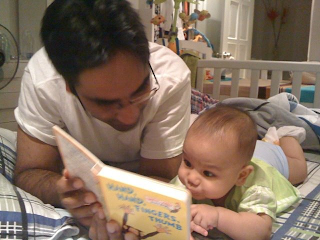Not yet approved by Nikhil
We have always wondered what's it like being a baby. Now, thank to recent research, we know!
" It's like being in love in Paris after three double espressos,” says Alison Gopnik, a University of Berkeley psychologist, "including waking up crying at 3 in the morning!"
Sure, they may while away their days eating, sleeping and soiling diapers. But it's high time that babies got some respect. Modern research is revolutionizing our understanding of the first years of life, revealing early childhood to be a frenzied period of intellectual, emotional and moral development. "Any child will put the most productive scientist to shame," as she writes about how babies think.“Babies and young children are like the R&D division of the human species."
“Babies are already as smart as they can be and have incredibly powerful ways of learning about the world."
If you just casually look at a baby, it doesn't look like there's very much going on there, but they know more and learn more than we would ever have thought. Every single minute is incredibly full of thought and novelty. It's easy as adults to take for granted everything it took to arrive at the state where we are. But babies take in much more information from different sources than adults do and work very hard to make sense of that information. It's one reason we think babies sleep so much — they're doing much harder work than grown-ups are!
At birth babies' brains have 100 billion neurons -- as many as they will ever have. As a baby grows, so do these neurons, forming branches that connect with other neurons to transmit signals and share information. Each bit of information a baby takes from his environment stimulates a different part of the brain and reinforces particular neural connections. In the first two months alone, the number of these connections increases from an estimated 50 trillion to 1,000 trillion.
The learning starts with the sounds and sensations a baby experiences before he's even born. At birth, the sense of hearing is more developed than vision. "Full-term infants have the benefit of having heard their mother's voice for weeks preceding delivery and when a newborn hears his mother's voice, he shows a different pattern of brain activity than when he hears a stranger's.
Outward evidence of a baby's learning and thinking is subtle at first: the newborn modifying his sucking to adapt to the breast, bottle, or pacifier; the 3-week-old who takes a break from feeding to look into her mother's eyes. Because a newborn's vision is believed to be no better than 20/400 -- meaning he sees things at 20 feet away as a person with perfect vision would see them from 400 feet away -- he can focus only on things within seven to ten inches from his face. So he is more attracted to stark contrasts, such as black and white. But as the connections between neurons in the brain's visual cortex increase, a baby begins to see more clearly. His depth perception also develops as he begins to coordinate his eye movements so that both eyes focus on the same thing at the same time. Now a baby may become fascinated by the finer features of a toy or his parents' faces, noticing three-dimensional details rather than looking only at the edges of objects.
By the time babies are 2 to 3 months old, they'll begin watching people as they walk across the room and be able to make eye contact with Mom and Dad. At this point, vision improves enough that babies are ready for new things to stimulate them (while still being attracted to the details of familiar objects that they are only now noticing). Vision improves to 20/60 or better around 6 months of age, allowing your little bundle to distinguish your face from the sea of adult faces he's already encountered.
"When I'm hungry, one of them feeds me," thinks the baby. An infant may look across the room toward the refrigerator because she's learned that bottles come from there. A breastfed baby may look at Mom the same way, as if to say, "Hey, there's the one with the milk!"
By 4 to 5 months of age, a baby will visually follow an object -- such as a spoon or a rattle -- when it falls out of her hand, marking the beginning of her understanding that she is separate from other people and things around her. A baby is beginning to crack into the huge world of encoded communication that flies around -- what we call language.
As the baby's babbling becomes more distinct (around 8 to 10 months), parents begin to wonder if she is actually forming words: "mama," "dada," or even complex phrases. But in general, babies this age don't associate words with meanings. By babbling, a baby practices forming the varied sounds of her native language, with parents trying to help by providing lots of verbal input.
By 8 months, babies begin to retain words in their long-term memory, even though they don't comprehend their meanings. At 12 months of age, most infants have retained enough information to understand 50 words, and by 18 months, they'll probably be able to use those words themselves.
Most parents already know that infants thrive on attention. Our instincts tell us to cuddle, talk, read, and play games with our children. But despite all that we know about our babies' developing brains, each infant is born with a distinct personality and potential. Day by day, he'll offer up more insights about who he is. It's a mystery that is revealed all too quickly, since by the time he's a toddler, few of his thoughts are likely to go unexpressed.
Baudelaire was right: "Genius is nothing more nor less than childhood recovered at will."





